Farming and food systems are an integral part of life.
Sustainable farming and food systems are essential for a community to grow and truly thrive.
Northeast Sustainable Agriculture Research and Education (SARE) grants connect farmers and people who work with farmers (Some are even available to people who work with people who work with farmers) with millions of dollars every year for projects that educate, engage, examine, and inspire the the future of sustainable agriculture.
Every day, you interact with products and services that wouldn't exist without farmers. Connecting your local farmers with a Northeast SARE grant is your opportunity to help hard working people improve your community. Northeast SARE Grants are more than funding, they are a chance to build a stronger future for the environment, communities, and businesses.
Here's How You Can Help:
Spread the word on social media:
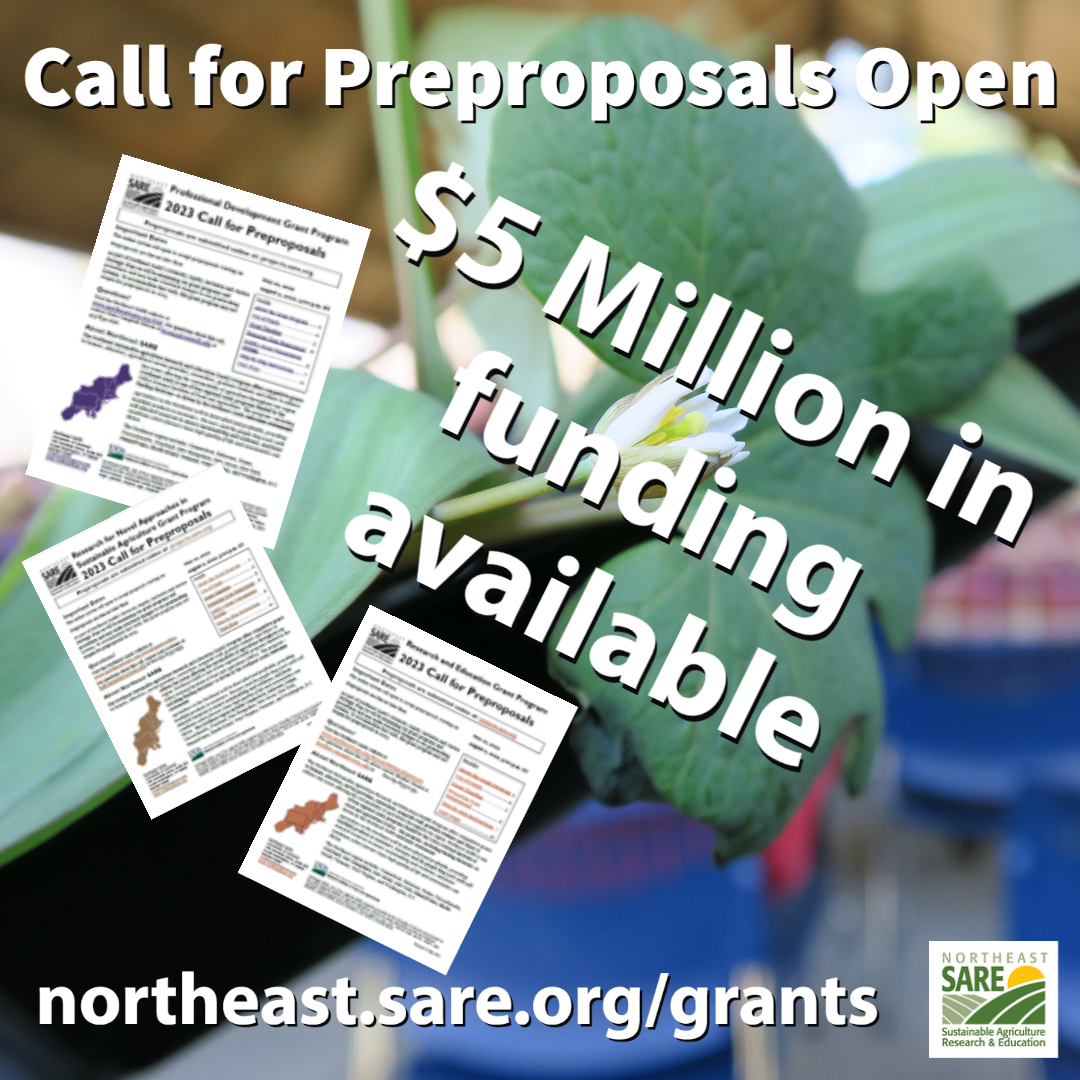
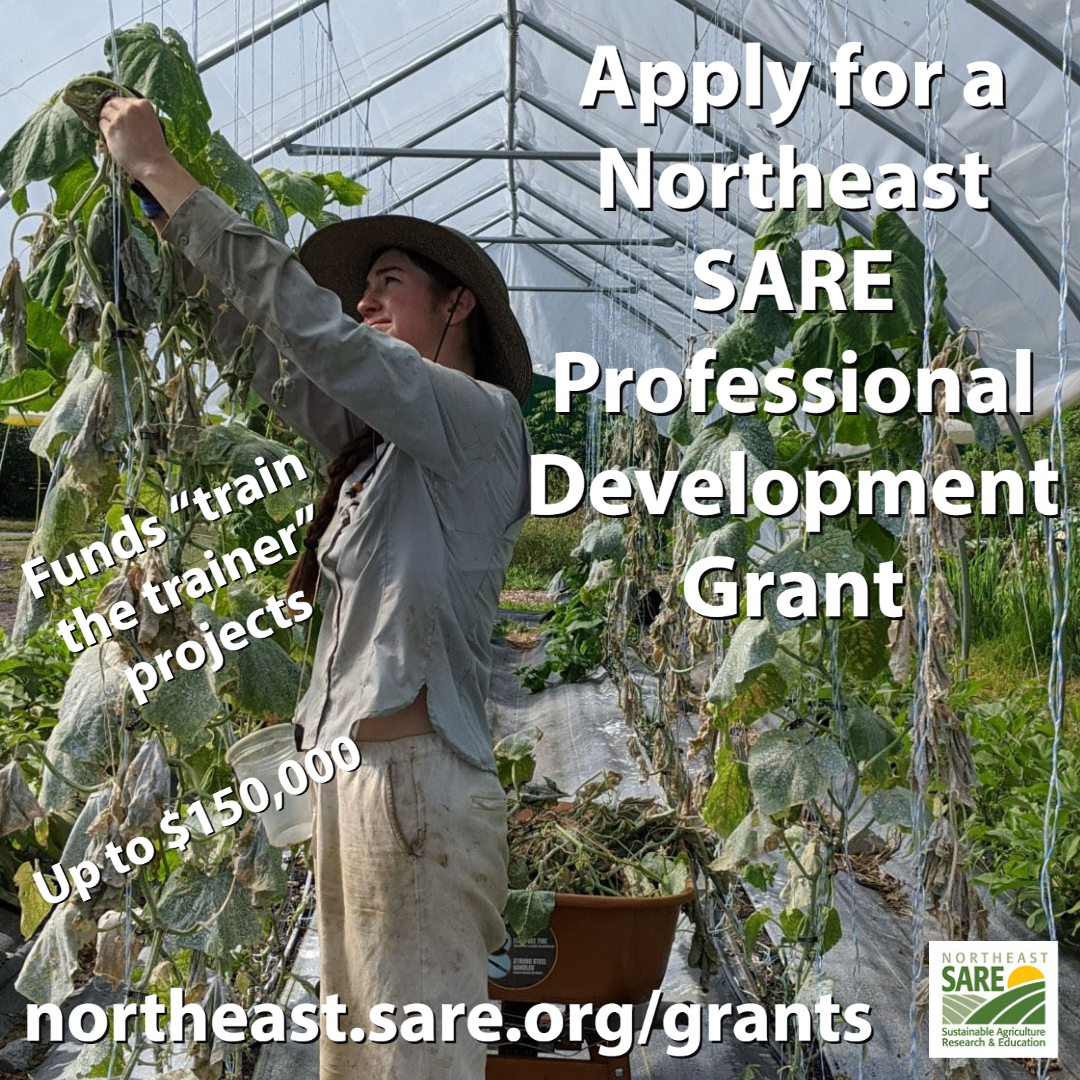

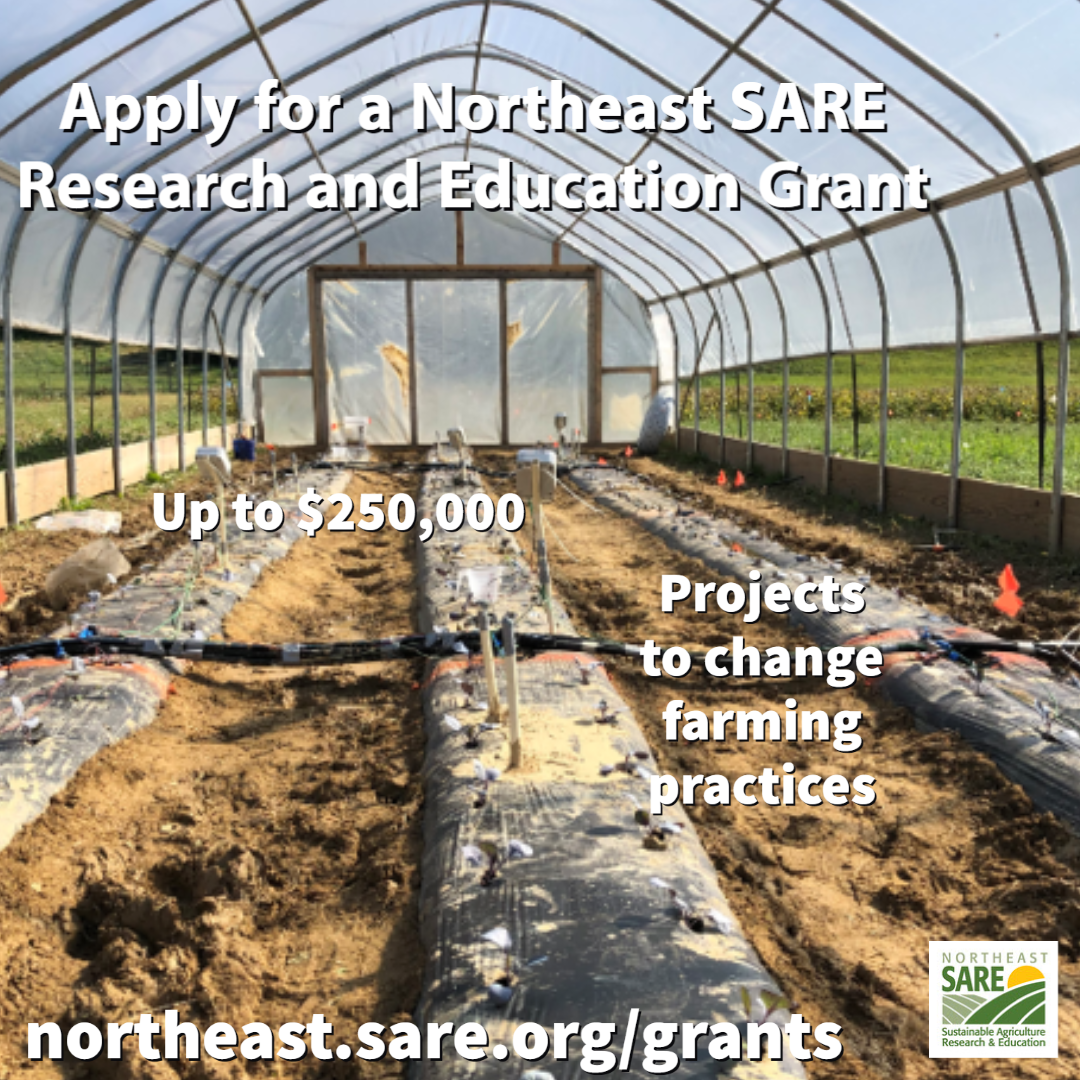
Share the stories of our Large Grant Programs:
Calls for Proposals are open for Northeast SARE's three largest grant programs. Below are images from some recent Northeast SARE Large Grant projects. If you're interested to see more Northeast SARE projects, you can search the full SARE Project Database at projects.sare.org.
Research and Education
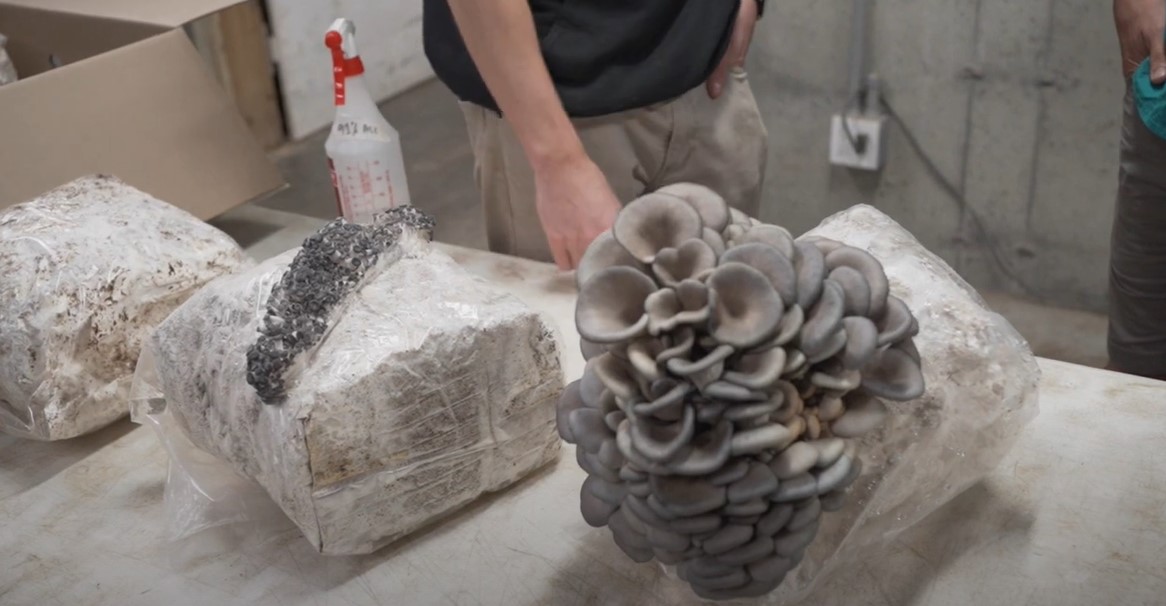
In Research and Education Grant project LNE19-376 - Growing the Specialty Mushroom Industry in the Northeast Project Leader Willie Crosby, of Fungi Ally, conducted research on five mushroom cultivation farms and connected with more than 350 farmers during two-hour in person workshops held throughout the northeast. The project addressed a critical gap between rising interest from farmers in starting mushroom production and a lack of resources and assistance to plan and start a mushroom operation.
Research for Novel Approaches
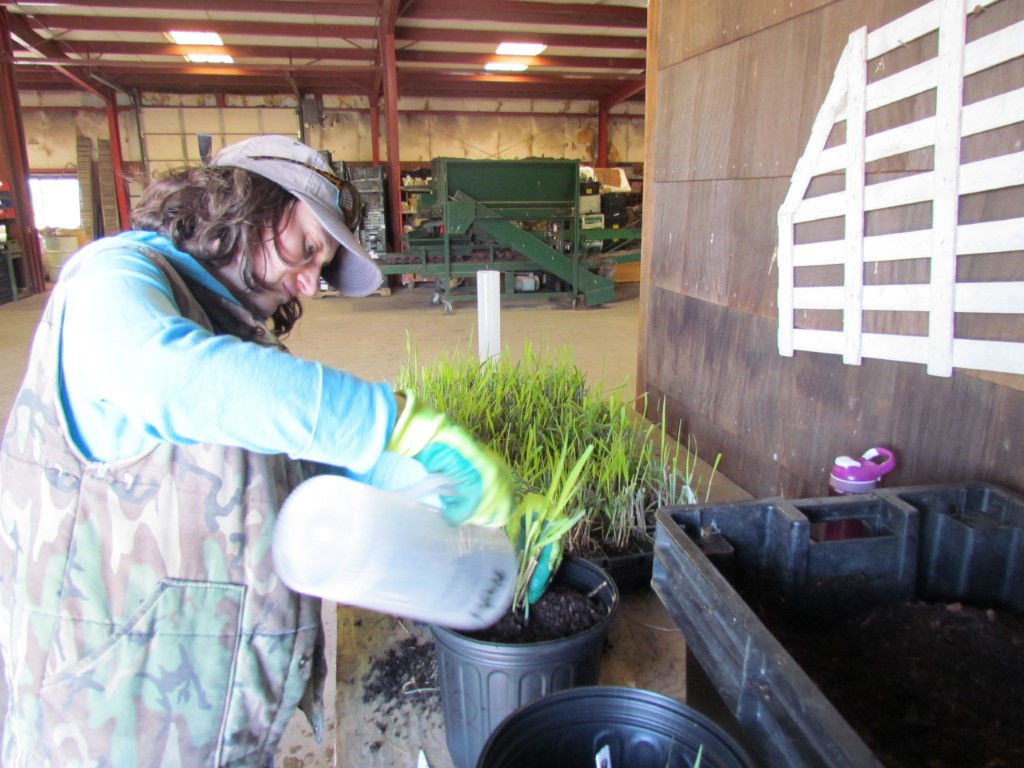
In Research for Novel Approaches Grant project LNE19-384R - Impact of Biochar on Moisture and Nutrient Retention in Long Island Nurseries, Project Leader Dr. Deborah Aller, of Cornell Cooperative Extension of Suffolk County, seeks to enhance understanding of biochar’s impact on both field and container nursery production. Mina Vescera (above) potted up switchgrass for a biochar container trial.
Professional Development
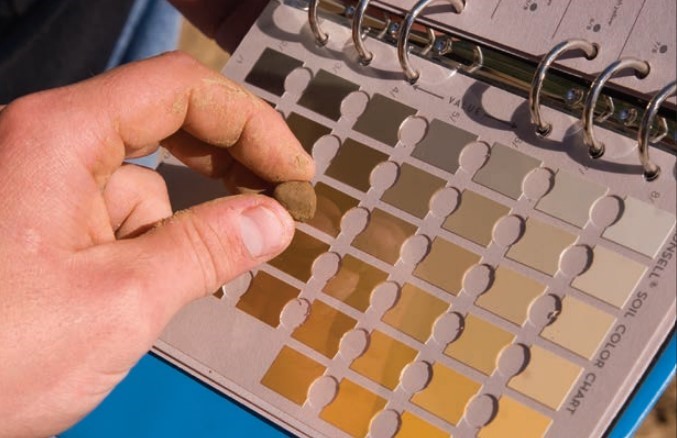
In Professional Development Grant project ENE19-158 -The Soil Life Short Course: Empowering Ag Professionals to Recognize, Quantify, and Conserve Beneficial Soil Animals, Project Leader Eric Lee-Mader, of The Xerces Society, aims to impact 10,000 acres of farmland by training service providers to recognize, quantify, and conserve essential invertebrates in soil. A Munsell chart is a tool used to categorize the color of a soil. This image appears along many others in “Farming with Soil Life: A Handbook for Supporting Soil Invertebrates and Soil Health on Farms”, which was produced as part of the grant project.
Spread the word about open grant proposals by sharing the press release copy below:
Northeast Sustainable Agriculture Research and Education (SARE) is accepting preproposals to distribute $5 million in funding across its three largest grant programs.
Research and Education, Research for Novel Approaches, and Professional Development Grants begin at $30,000 and provide as much as $250,000 for projects growing the future of sustainable agriculture in the Northeast. The deadline to submit preproposals is 5 p.m. EST on August 2, 2022.
All three grant programs currently accepting preproposals are open to anyone who works with farmers. Professional Development Grants are also open to those who work with service providers that serve the agricultural community. Typical projects range from 2-3 yearsand all projects must be completed by November 30, 2026.
The Northeast region includes: Connecticut, Delaware, Maine, Massachusetts, Maryland, New Hampshire, New Jersey, New York, Pennsylvania, Rhode Island, Vermont, West Virginia, and Washington, D.C.
Northeast SARE has allocated $2.25 million for Research and Education Grant projects in 2023. Research and Education Grants range from $30,000 to $250,000 and fund projects that result in gains in farmer knowledge, awareness, skills and attitudes that are then applied to make measurable on-farm changes leading to greater sustainability.
Research and Education projects include an education program for farmers that seeks to achieve a “performance target” that describes the changes in practices, behaviors or conditions among farmers expected to result from the proposed project.
Northeast SARE has allocated $1.75 million for Research for Novel Approaches Grant projects in 2023. Research for Novel Approaches Grants range from $30,000 to $200,000 and fund “proof of concept” projects intended to confirm the benefit and/or feasibility of new practices and approaches that have high potential for adoption by farmers.
These practices and approaches may be related to production, marketing, business management, human resource management and other social issues, or other topics related to sustainable agriculture.
Northeast SARE has allocated $1 million for Professional Development Grant projects in 2023. Professional Development Grants range from $30,000 to $150,000 and fund train-the-trainer projects that develop the knowledge, awareness, skills and attitudes among the full range of service providers who work with farmers, including agricultural professionals who teach, advise and assist farmers about sustainable agriculture practices and strategies as well as non-agricultural service providers (e.g., attorneys, lenders, etc.) that work with farmers.
These service providers then use the knowledge, awareness, skills, and attitudes they gain in their work with farmers.
Preproposals are preliminary concept documents evaluated by independent review teams made up of farmers, researchers, nonprofit staff, and agricultural service providers. Reviewers evaluate proposals on a scale of 1 to 5 and assign a single score to the preproposal based on the extent to which it addressed review criteria.
Roughly one-third to one-half of preproposals are invited to submit full proposals and about one-third of full proposals are approved for funding by the Northeast SARE Administrative Council.
Both invited and not-invited applicants receive feedback from reviewers. Northeast SARE reviewer feedback is an invaluable resource for any organization looking to write grants related to sustainable agriculture.
Northeast SARE will be examining its grant programs and procedures as part of its Diversity, Equity, Inclusion and Justice Strategic Plan. To accommodate that work, these grant programs may not call for preproposals in 2023.
A Preproposal Grant Webinar will take place at noon on June 23, 2022. The webinar will explore the different grant programs, application process, and frequently asked questions.
Links:
Northeast SARE’s Definition of a Farm: northeast.sare.org/farmdefinition
Northeast SARE’s Outcome Statement: northeastsare.org/outcomefunding
northeast.sare.org/grants/get-a-grant/research-and-education-grant-program/
northeast.sare.org/grants/get-a-grant/research-for-novel-approaches/
northeast.sare.org/grants/get-a-grant/professional-development-grant-program/
